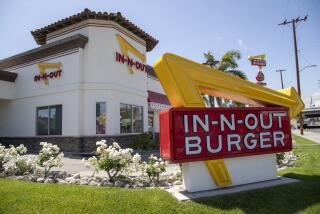Market Scene : Southeast Asia Nations Scrambling to Gobble Up U.S. Firms : Thailand, Singapore and others are hoping to secure their markets by investing in the West.
- Share via
BANGKOK, Thailand — The headquarters of Thailand’s Unicord Co. are in a nondescript suite of offices on a rundown side street in Bangkok--a far cry from the boardrooms of giant multinational companies where most major mergers and acquisitions are carried out. But Unicord has carved a special niche for itself in Southeast Asia by becoming the region’s largest investor in the United States.
While most investment dollars are flowing from the United States to Southeast Asia, there is a small but growing flow of investment going in the other direction as the Asian companies, looking to secure their markets, snap up companies in the United States. As in the past, most Asian investment in the United States still comes from such North Asian countries as Japan, Taiwan and South Korea. But now Southeast Asia is joining the scramble.
Unicord, which was founded with only $400,000 in 1978, became the Southeast Asian leader in the field in 1989 when it bought San Diego-based Bumble Bee Seafoods Inc., the third-largest seller of canned tuna fish in the United States with annual sales of $400 million. Unicord paid $269 million for the firm, which had been put up for sale by Pillsbury, a U.S. subsidiary of the British conglomerate Grand Metropolitan.
Before the Bumble Bee purchase, Unicord had been the world’s largest supplier of tuna, but it was at the mercy of industry middlemen who bought the fish for resale to the leading brands. At the same time, Bumble Bee had to pay premium prices to guarantee a supply of the prime cuts of meat.
“Now Unicord can be assured of a distribution network in the United States, while Bumble Bee is sure of its supply,” said Unicord Chairman Kamchorn Sathirakul, a former governor of the Bank of Thailand. “Now we’ve become a truly integrated, global business.” Unicord’s strong point had been low wages at its Thailand factory, where it employs 7,000 people to process raw tuna. But because of tariffs on canned seafood imports, Unicord built an automated tuna cannery near Sante Fe Springs outside Los Angeles.
“Thai companies, especially in the food-processing business, are aggressively seeking out U.S. companies which control their markets in order to lock up a foothold in fortress Europe and fortress U.S.A.,” said Graham Catterwell, an analyst at Crosby Securities in Bangkok.
Other major investments have included a ceramic-tile factory in Clarksville, Tenn., set up by Siam Cement, Thailand’s leading industrial company, and the Melrose Hotel in Dallas, purchased in April by a consortium led by the Bangkok-based Dusit Thani Hotel Group.
In all of 1988, Thailand had a capital outflow--investments overseas--of just 615 million baht, less than $25 million. By 1991, the figure had reached $137 million in the first six months of the year.
The same picture exists elsewhere in the region. Singapore soft-drinks giant Yeo Hiap Seng Ltd. paid $52 million to buy Chun King, a maker of Chinese food, from RJR Nabisco Inc. By buying Chun King, Yeo acquired a distribution network throughout the United States in addition to a well-known brand name.
The Chun King purchase was also the first time the Singapore government had helped a private company finance a takeover in the U.S. market.
In April, 1989, Trade and Industry Minister Lee Hsien Loong had urged local companies to “go international” and promised government support for investments that generate spinoffs for the Singaporean economy.
So when Yeo bought Chun King, the Singapore government’s secretive investment arm, Temasek Holdings, contributed half of the purchase price. Eventually, Temasek will sell its shares to Yeo.
In another government-backed investment, a subsidiary of Singapore Aerospace called Mobile Aerospace Engineering Inc. set up a $20-million facility in Mobile, Ala., to refurbish commercial aircraft.
The Singapore government is also looking beyond the United States. In 1990 it spent nearly $440 million to buy Brierly Investments, a New Zealand holding company, and its British Hotel subsidiary.
“Apart from a good return, Temasek looks for good contacts and connections which it can pass on to Singapore companies,” Finance Minister Richard Hu said.
More to Read
Inside the business of entertainment
The Wide Shot brings you news, analysis and insights on everything from streaming wars to production — and what it all means for the future.
You may occasionally receive promotional content from the Los Angeles Times.










